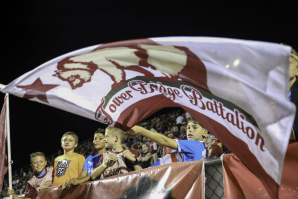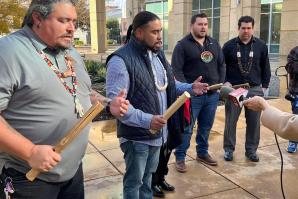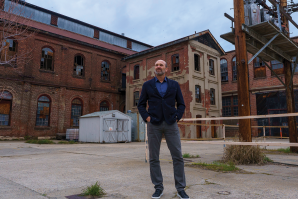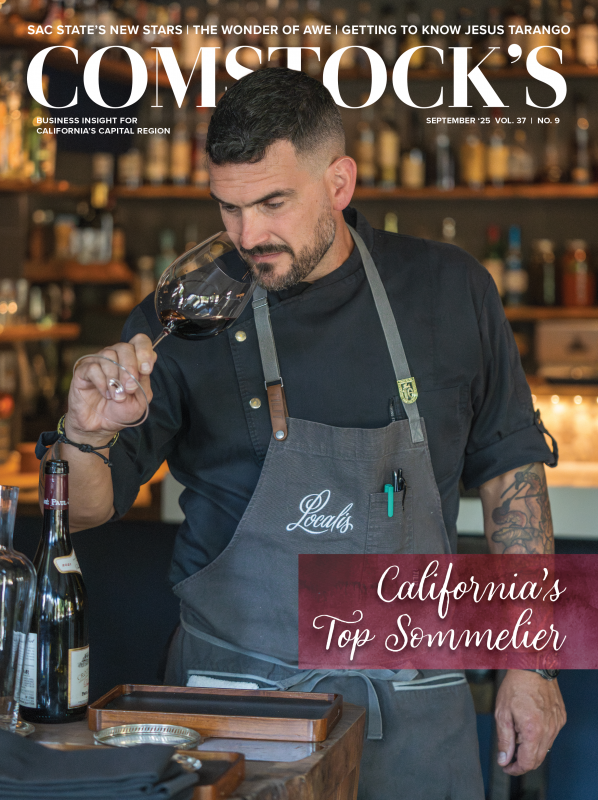People who work for Jesus Tarango address him as “Chairman” — not “Mr. Chairman” when speaking to him, nor “the chairman” when speaking of him. Just “Chairman.” It’s a measure of respect similar to restaurant workers referring to the kitchen boss as “Chef” and musicians calling the orchestra leader “Maestro.”
“Different tribes have different names for the top executive,” says Tarango, the chairman of Wilton Rancheria, a federally recognized tribe of Miwok people. The tribe includes in its business portfolio the fabulously successful Sky River Casino, which opened in Elk Grove just three years ago, and the increasingly popular, heading-for-major-league-status soccer team, Sacramento Republic FC, of which it became the majority ownership partner last fall.
Developer Kevin Nagle, who brought the team in 2017, is now the minority owner and managing partner. Ground was broken in August on a $200 million, 12,000-seat stadium that’s on a fast track to open in two years, with a 3,600-seat entertainment venue also in the offing.
“Some people say chief, and some call their boss the president or the CEO,” Tarango continues. “The tribes themselves decide on the titles and the government structure of their organization.”
For Wilton Rancheria, that structural model seems closer to local government than the world of C-suites. Tarango is serving his second of two four-year terms as chairman. He was first elected in 2020, then re-elected in 2024. “I’m out as of 2028,” he says with a grin but also a slightly raised eyebrow. Asked about how inevitable that is, Tarango says he has mixed feelings about term limits.
“Well, it’s in our constitution, which almost every tribe has,” he says. “But in some tribes, where the top person has stayed in office for 20 years or more, the leaders have offered to talk to our people to explain why that can work to the tribe’s advantage.”
He cites institutional memory — a leader being around long enough to know how things got done a decade ago as a template for the present and the future — as well as reliability in decision-making. “When you know someone and know how his thinking works, it makes a huge difference,” he says. “No one has to wonder with me. I say what I mean and mean what I say.”
At 44 years old, Tarango displays both the tact of a seasoned executive and the biceps of a nightclub bouncer. Bursting out of his knit polo shirt, his arms feature beautifully tattooed portraits of famous Native Americans (like Geronimo and Crazy Horse) as well as his own immediate ancestors. He also pulls up a trouser leg to display the ink handiwork he calls “markings,” which decorate his shins.
The former Valley High football player refers to himself as “an ex-jock,” the “ex-” doesn’t quite match: He looks supremely fit and exudes a kind of conversational energy — speaking rapidly but articulately, smiling easily and listening intensely — that often accompanies restless intelligence.
Tarango and Reina, his wife of 16 years, have a blended family of six children. “My dad’s Mexican and my mom’s a Wilton Indian. He was very cool about my mom raising me in the Native American tradition,” he says. And no wonder: Jesus’ mom is Tribe Elder Mary Tarango, who led the battle to secure the reinstatement of the Wilton tribe 17 years ago by the U.S. Department of the Interior. It had been stripped of its status under the 1958 California Rancheria Act, which was part of the country’s effort to scuttle the tribal lands trust relationship to force Indian nations to assimilate into the social mainstream.
Wilton Rancheria’s remarkable comeback story — from disenfranchised ethnic entity to increasingly powerful political and economic player — seemed like a good place to officially begin our chat.
COMSTOCK’S: Do people in your tribe feel a sense of vindication in not only regaining the respect of the nation but also becoming such an important business contender with the ownership of the casino and, now, Sac Republic FC?
TARANGO: That’s been kind of the tightrope I’ve had to walk. On one side I have people who are very positive about the direction we’ve been moving in, and on the other side some people who remain very negative and skeptical. As chairman, my job is to hear what everyone has to say and be transparent in my thinking, as much as that’s possible when you’re in the business world as well as my real world: the Wilton people.
As chairman, my job is to hear what everyone has to say and be transparent in my thinking.
COMSTOCK’S: We’ve read how inspirational your mom has been for your tribe’s turnaround. But you also have very strong and very positive feelings about your dad.
TARANGO: Oh, yes! My mom says my dad’s been the wind beneath her wings. He’s encouraged her at every turn. But he’s done the same for me. He’s a retired college professor. When I was just a unit or two away from finishing my B.A. degree at Sac State in ethnic studies, FedEx, where I’d been working throughout college, offered me a top management job.
I was pretty unique, being a non-white in a very white corporate world. I said to my dad I was thinking about dropping out and taking the job. I thought he’d tell me to stay in school because our people really prize education. He said to me, “How old are you now?” I was 20. He said, “So if it doesn’t work out after a year and you want to go back to college, you’ll only be 21.” He said all of this without suggesting what I do.
COMSTOCK’S: He did what my dad used to do with me — use Socratic reasoning.
TARANGO: (Laughing) How so?
COMSTOCK’S: By asking questions instead of dispensing advice, giving you the means to decide for yourself.
TARANGO: I do that a lot with my tribe and my kids. I let them know where I stand but not always at first.
COMSTOCK’S: What made you choose Elk Grove and now, The Railyards, for your major projects?
TARANGO: Location and population. Populations drive the success of casinos. We had been thinking of building Sky River in Galt and, of course, in Wilton itself, our traditional home. But the tribal elders wanted us to do more than build a gambling place. They wanted housing, health care and room to grow. We’ve also purchased 66 acres to the south of the resort and another 138 acres near the freeway. In Elk Grove, we’re becoming one of the top two destinations in California.
COMSTOCK’S: And the soccer project?
TARANGO: A couple of thoughts there. First, when you think of successful businesses owned by Native American tribes, you mainly think of casinos, smoke shops and gas stations. We’re now the only tribe to own a male sports team, which we anticipate will become an MLS (major league soccer) team.
Building a stadium here represents a sort of homecoming for us. We’ll be a gathering place again — and this time, for the entire community, not just ourselves.
Second, in buying Sac Republic FC, we’ll be in the Railyards area, which was a gathering place for all of the region’s tribes many years before, because of its proximity to the water and railroad and the land itself. Building a stadium here represents a sort of homecoming for us. We’ll be a gathering place again — and this time, for the entire community, not just ourselves. I also want to give credit to the tribe’s chief operating officer, Chris Franklin. He’s also my cousin. In January of last year, he’s the one who came up with buying a soccer team. Totally outside the box!
COMSTOCK’S: I’m guessing the city of Elk Grove is pretty grateful to the Wilton Rancheria tribe for your presence there.
TARANGO: (Beaming) Well, they’re starting to raise our tribal flag along with the California, America and City of Elk Grove flags every day. That says something to me.
–
Stay up to date on business in the Capital Region: Subscribe to the Comstock’s newsletter today.
Recommended For You

Sacramento Republic FC and Wilton Rancheria Break Ground on New Railyards Stadium
After a decade of setbacks, club and tribe launch construction on 12,000-seat venue set to open in 2027
It’s been a decade-plus rollercoaster ride for Sacramento Republic FC’s efforts to build a new stadium, but on a bittersweet historic day for Elk Grove’s Wilton Rancheria, the tribe and SRFC broke ground on a $175 million, 12,000-seat multi-use stadium in The Railyards district north of downtown Sacramento.

Making an Acknowledgment
City of Sacramento recognizes tribal land
Tribal officials are working with Sacramento city government to secure a formal recognition of tribal land, creating opportunities for education.

Getting the Casino Rolling
Elk Grove leaders tout promising opening months for Sky River Casino
After several years of work by Wilton Rancheria, the tribe’s casino operator Boyd Gaming, and local leaders, Sky River is finally up and running.

Regaining Lost Land
FROM THE PUBLISHER: When I heard the news about the Sacramento Republic FC ownership change — with Wilton Rancheria, a federally recognized Miwok tribe in Sacramento County, becoming majority owner (while Kevin Nagle maintains his managing partner role) — I joined the entire Capital Region in celebrating what this would mean for Major League Soccer, as well as for the continuing (and delightful) growth of professional sports here.

Sweetening the Pot
Tribal casinos in the Capital Region have major construction projects underway
Amid the ongoing pandemic, several tribes in the Capital Region
are either building new casinos or undertaking significant
expansions of existing operations.

Resurrecting the Railyards
After a major environmental cleanup, ground is expected to be broken this year on a new hospital, stadium and entertainment center
The Railyards, an urban infill project, promises to transform downtown Sacramento, nearly doubling its existing size. The property consists of 240 acres north of the Amtrak station on H Street and east of Interstate 5.




